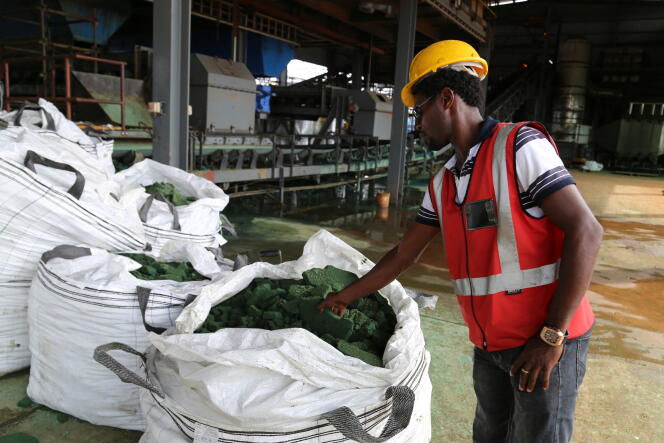
Visiting the south of the Democratic Republic of Congo (DRC), President Félix Tshisekedi announced in mid-May his intention to “Readjust” mining contracts signed under his predecessor, Joseph Kabila. He blasted “These investors (…) who come with empty pockets and leave billionaires ”, while the majority of the population “Still languishing in misery”. But, for Jean-Pierre Okenda, director of the extractive industries department within the NGO Resource Matters, the fault does not rest only on the shoulders of foreign operators.
On what basis were the contracts challenged by President Tshisekedi negotiated?
The problem dates back to the early 2000s. Left bloodless from the two Congo wars [1996-1997 puis 1998-2003], the State is then on the verge of bankruptcy. To encourage foreign investment and allow national companies to develop after decades of mismanagement, the mining sector is liberalized. Many joint venture contracts, or “joint ventures”, were signed at this time between state mining companies and foreign operators. But these partnerships quickly turn out to be very unbalanced.
For lack of financial means, Congolese companies like Gécamines [la principale entreprise minière, fondée pour exploiter le cuivre de l’ex-Katanga], are found in the minority in joint ventures. Certain royalties or royalties are even returned to foreign investors, whereas they should return to the public treasury. Albert Yuma, the president of Gécamines, also at the head of the Congolese employers, is himself accused of having signed contracts involving transfers of royalties or transfers of assets violating the mining code …
The head of state accused foreign operators of “lining their pockets”. Are they the only ones responsible for the situation?
No and I would even say that it is the Congolese companies that are at the heart of the problem. After all, they are the ones who are supposed to manage the mining portfolio on behalf of the state. However, when contracts are signed, the value of assets is systematically underestimated. There are always suspicions of corruption. Income management is so catastrophic that some Congolese companies are today unable to pay their taxes and pay salaries.
The contracts signed with Chinese companies under Joseph Kabila seem particularly singled out. Why ?
Take the case of the Sicomines joint venture, concluded between Gécamines and several Chinese companies: the project benefits from tax and customs exemption and full administrative facilities. Even Chinese worker visas are available! In return, Chinese companies have opened a multi-billion dollar line of credit to the DRC to build infrastructure. The exemptions granted to them are supposed to accelerate the repayment of this credit, in addition to the profits generated by mining production. But there is a total lack of transparency on this agreement: it is not even known if the mineral reserves will be enough to repay the Chinese loan. We also have no idea of the repayment schedule. There is no independent monitoring, no parliamentary oversight.
Can the revision of mining contracts help improve the living conditions of the Congolese?
I do not believe. It is, of course, a first step, but the contracts bring money to the State companies and not directly to the State budget. In order for these revenues to benefit the population more, it would be necessary to review the entire governance of the sector and develop a more holistic approach. For example, it would be a good idea for the miners to obtain a larger share of the goods and services they need locally. This is done in Ghana: in 2019, mining companies bought 70% of goods and services locally. In the DRC, this is an aspect neglected by the mining code.
The IMF has asked the DRC to establish more transparency in the mining sector, prior to negotiations on a forthcoming aid program. Can this influence future reforms?
The IMF is right to encourage more controls, but there is work … Regarding mining contracts, the renegotiation agenda should at least be known, as well as the number of contracts concerned. objective and the identity of the negotiators.
For the rest, the opacity is total. We do not even have access to the annual reports of state enterprises, or to their financial statements. However, it is done elsewhere: in Zambia, or in Côte d’Ivoire for example. Here, we regress on transparency. The American NGO Natural Resource Governance Institute still classifies the DRC and state-owned enterprises in the category of “bad governance” or “failing governance”
–


